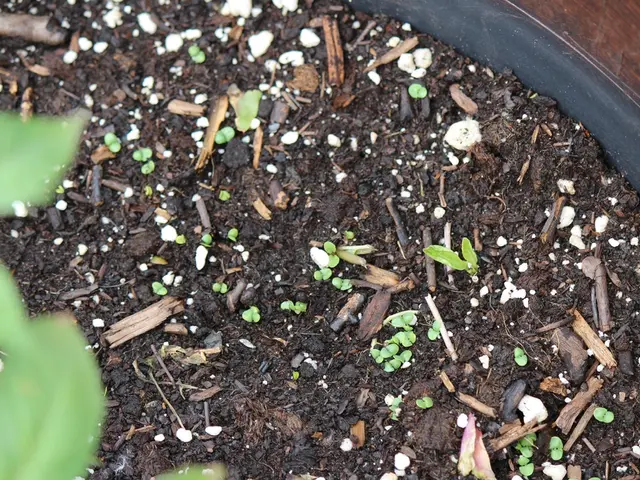Methods for Organically Managing Aphid Infestations Successfully
Managing Aphids Organically in the Home Garden: A Guide for Natural Pest Control
Aphids are small, soft-bodied insects that can cause significant damage to plants, often going unnoticed until their numbers multiply. For the conscientious gardener aiming for natural pest management, this prevalent pest poses a challenge. However, there are effective organic methods to control aphids without relying on chemical pesticides.
Identifying Aphids on Plants
Aphids, which measure less than 3 millimeters, can be found clustering in leaf crevices, particularly on young leaves. Their colors range from shades of beige, green, yellow, black, and even red. A telltale sign of an aphid infestation is the presence of ants, as ants feed on the liquid secreted by aphids, often called honeydew.
Impact of Aphids on Plants
Aphids suck on plant juices, leading to stunted growth and mottled leaves. In severe cases, aphid feeding results in yellowing, browning, and eventually dying leaves. Aphids can also transmit diseases from plant to plant.
Is it Necessary to Eliminate Aphids?
Aphids serve as food for beneficial insects in the garden, such as ladybugs, lacewings, and syrphid flies. These beneficial insects control other garden pests as well. Common organic aphid control methods, including insecticidal soap, neem oil, and diatomaceous earth, can inadvertently harm or deter beneficial insects, thus perpetuating the need for increased intervention.
Organic Methods to Control Aphids
For gardeners without an established ecosystem of beneficial insects, choosing between plant loss and temporary intervention using organic controls might be necessary. The least environmentally impactful methods, listed from least to most intrusive, are as follows:
- Prune Affected Stems: Remove the most heavily infested stems and crush others by hand.
- Use High-Pressure Water Spray: Dislodge aphids with a strong water stream, knocking them off the plant and onto the ground.
- Insecticidal Soap: Apply organic or homemade insecticidal soap directly onto aphids, ensuring coverage of the underside of leaves, and repeat treatment if needed after a week.
- Neem Oil: Use neem oil as a spray to kill aphids, as it does not harm beneficial insects when applied carefully. However, it does repel them, so use it sparingly.
Preventative Measures
The best approach to managing aphids is to prevent infestations by focusing on plant health:
- Rich Soil: Feed the soil with compost and organic matter to promote healthy plant growth.
- Attract Beneficial Insects: Plant flowers that draw aphid-eating insects, such as daisies, sunflowers, and yarrow.
- Diverse Garden: A rows of companion plants provides variety, making it less likely for pests to take over.
In Conclusion
A well-rounded, natural, and ecologically beneficial garden ecosystem is the best defense against aphids. However, while working towards this goal or if aphids threaten to overtake plants, these organic pest control methods can help minimize damage.
Encourage Healthy Gardening practices and share the knowledge with other beginner gardeners to cultivate a thriving, pest-managed garden.
Learn More:ACCESS THE FREE GUIDES NOW (Link to free resources)
- Aphids, small insects in home gardens, can cause plant damage if left unchecked, leading to stunted growth and potentially disease transmission.
- To manage aphids organically, one can identify them by their minuscule size (less than 3mm) and clustering in leaf crevices, often accompanied by ants feeding on the secreted honeydew.
- For those prioritizing natural pest control, there are numerous resources available, such as garden podcasts, organic gardening guides, and garden printables, offering tips on dealing with aphids and maintaining a thriving garden.
- Adopting a holistic approach to gardening can lead to a balanced ecosystem, where beneficial insects like ladybugs, lacewings, and syrphid flies control aphids and other pests.
- To foster this ecosystem, consider practices like companion planting, promoting rich soil health through the use of compost and organic matter, and attracting beneficial insects by planting aphid-attracting flowers like daisies, sunflowers, and yarrow.
- Pest control methods like insecticidal soap, neem oil, and diatomaceous earth can be employed when needed, but choose wisely to prevent harm to beneficial insects and maintain the balanced home-and-garden lifestyle you desire, focusing on health-and-wellness, fitness-and-exercise, nutrition, and overall lifestyle.








